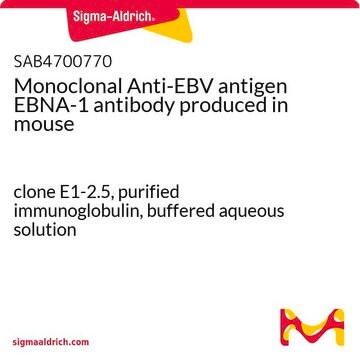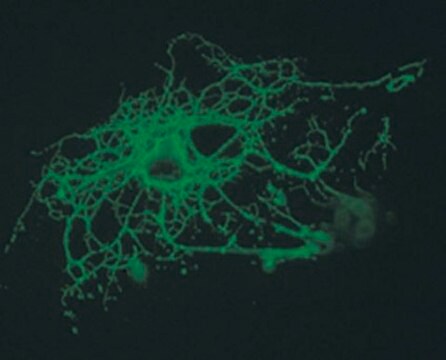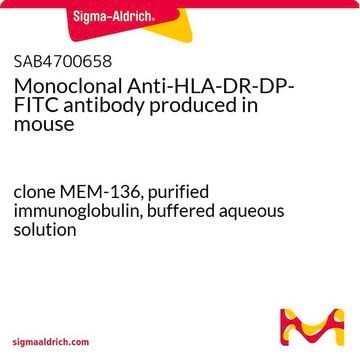MAB8151-I
Anti-West Nile Virus/Kunjin Antibody, Envelope Antibody, clone 3.91D
About This Item
Empfohlene Produkte
Biologische Quelle
mouse
Qualitätsniveau
Konjugat
unconjugated
Antikörperform
purified antibody
Antikörper-Produkttyp
primary antibodies
Klon
3.91D, monoclonal
Mol-Gew.
calculated mol wt 31.89 kDa
observed mol wt ~50 kDa
Aufgereinigt durch
using protein G
Speziesreaktivität
virus
Verpackung
antibody small pack of 100 μL
Methode(n)
ELISA: suitable
immunofluorescence: suitable
western blot: suitable
Isotyp
IgG3
Epitopsequenz
N-terminal half
Protein-ID-Hinterlegungsnummer
UniProt-Hinterlegungsnummer
Versandbedingung
2-8°C
Posttranslationale Modifikation Target
unmodified
Angaben zum Gen
vaccinia virus ... poly> POLY(912267)
Verwandte Kategorien
Allgemeine Beschreibung
Spezifität
Immunogen
Anwendung
Evaluated by Western Blotting with recombinant West Nile Virus envelope protein.
Western Blotting Analysis (WB): A 1:500 dilution of this antibody detected recombinant West Nile Virus envelope protein.
Tested Applications
Western Blotting Analysis: A representative lot detected West Nile Virus/Kunjin, Envelope protein in Western Blotting applications (Maeda, A., et al. (2009). Virus Res.;144(1-2):35-43; Saiyasombat, R., et al. (2014). Virol J.;11:150; Blitvich, B.J., et al. (2016). Am J Trop Med Hyg.;95(5):1185-1191).
ELISA Analysis: Various dilutions of this antibody detected recombinant West Nile Virus/Kunjin, Envelope protein.
Immunofluorescence Analysis: A representative lot detected West Nile Virus/Kunjin, Envelope protein in Immunofluorescence applications (Maeda, A., et al. (2009). Virus Res.;144(1-2):35-43; Osorio, J.E., et al. (2012). Am J Trop Med Hyg.;87(3):565-72).
Note: Actual optimal working dilutions must be determined by end user as specimens, and experimental conditions may vary with the end user
Physikalische Form
Lagerung und Haltbarkeit
Sonstige Hinweise
Haftungsausschluss
Not finding the right product?
Try our Produkt-Auswahlhilfe.
Lagerklassenschlüssel
12 - Non Combustible Liquids
WGK
WGK 1
Flammpunkt (°F)
Not applicable
Flammpunkt (°C)
Not applicable
Analysenzertifikate (COA)
Suchen Sie nach Analysenzertifikate (COA), indem Sie die Lot-/Chargennummer des Produkts eingeben. Lot- und Chargennummern sind auf dem Produktetikett hinter den Wörtern ‘Lot’ oder ‘Batch’ (Lot oder Charge) zu finden.
Besitzen Sie dieses Produkt bereits?
In der Dokumentenbibliothek finden Sie die Dokumentation zu den Produkten, die Sie kürzlich erworben haben.
Unser Team von Wissenschaftlern verfügt über Erfahrung in allen Forschungsbereichen einschließlich Life Science, Materialwissenschaften, chemischer Synthese, Chromatographie, Analytik und vielen mehr..
Setzen Sie sich mit dem technischen Dienst in Verbindung.






